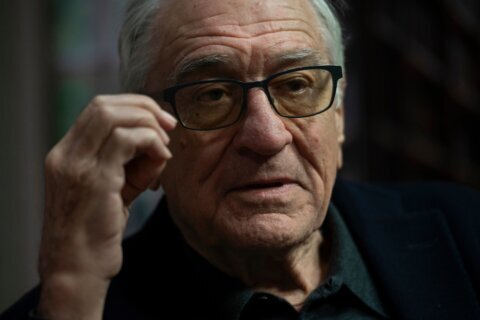It was exactly 20 years ago on Oct. 15, 1999 that David Fincher’s “Fight Club” hit theaters, as Edward Norton and Brad Pitt united to shock us with Tyler Durden.
Now, Norton is breaking the No. 1 and No. 2 rules — talking about “Fight Club.”
“It’s blink and you miss it,” Norton said. “Aficionados have found the places where Fincher put single-frame or two-frame pops of Tyler appearing in the mind.”
He said the cast and crew knew they were making something extraordinary.
“There was a group of people — me, Brad, David, [script doctor] Andy Walker, Helen [Bonham Carter], terrific designers, Jeff Cronenweth one of the great contemporary cinematographers — we were all the same age marinating in the sensation that there were things people our age were struggling with,” Norton said. “Chuck [Palahniuk]’s book tapped this vein. … If we didn’t piss some people off, we didn’t go far enough. We knew not everybody was going to get the joke.”
However, Norton has little time to look backward at his filmography. Instead, he’s focused on writing, directing and starring in his new film “Motherless Brooklyn,” which hits theaters Nov. 1. Based on the novel by Jonathan Lethem, it follows a lonely private detective, Lionel Essrog (Edward Norton), trying to solve the murder of his friend and mentor, Frank Minna (Bruce Willis), in 1950s New York City.
“It hooked me on page one,” Norton said. “The book takes place in 1999, so resetting it in the ’50s and building in the plot about discrimination in housing and this fairly brutal autocrat who ran New York in that period and was kind of that shadow dictator of New York in the ’50s, that’s a complete departure from the book. … Ultimately, the author gave me his blessing to reset it in the ’50s.”
That autocrat is Moses Randolph (Alec Baldwin), who claims he isn’t merely above the law but ahead of the law.
“Alec is such a fine dramatic actor and always has been,” Norton said. “He has a command of language that is really extraordinary. He reminds me of some of those great mid-century actors like Lee J. Cobb or Orson Welles. … He has that sort of heft. You feel a lethal, powerful sense of capacity to intimidate, to bully, but his intellectual force at the same time. There’s not a lot of people like that. The character that he plays is an intellectual giant as well as a power broker.”
Film buffs will draw instant comparisons between Baldwin’s Moses Randolph and John Huston’s Noah Cross in “Chinatown” (1974), respectively hijacking New York’s Borough Bridge Authority and Los Angeles’ Department of Water and Power.
“What’s great about ‘Chinatown’ is that it’s about the ’30s but it was made in the ’70s,” Norton said. “Americans were saying the military industrial complex has completely lied to us about this war and Watergate is unspooling. The film said, hey, by looking at the past and the dark, shadow narrative that was under the sunny L.A. of the American Dream, we distill something about what is going on right now. … Bogart, Nicholson, the detective stands for all of us. He wanders into that shadow narrative and says, ‘You know? This is starting to irritate me.”
Visually, the neo-noir tones pull inspiration from “L.A. Confidential” (1997).
“99 out of 100 people couldn’t tell you what the plot of ‘L.A. Confidential’ was,” Norton said. “What you remember is that when you drop into it, the music, the performances, the way it looks, everything works a kind of hypnosis. Suddenly you go, whoa, this is not kitschy, cliché or tongue-in-cheek, this has got guts and it’s real. I feel like I’ve gone through a portal back to that moment. … That’s what I think is great about those classic films and that’s what we were trying to make.”
Unlike “Chinatown,” the hero of “Motherless Brooklyn” is not the strong, silent type like Jack Nicholson. Instead, Lionel grapples with Tourette’s syndrome.
“The most insulting thing you can do in depicting any kind of unique condition, affliction or disability … is to take away the complex humanity,” Norton said. “The reason ‘My Left Foot’ is a great film is that, yes, he has this condition, but he’s a real jerk to people and he’s funny. He refused to be defined by it. … It’s great to root for an underdog. That’s what’s wonderful about ‘Forrest Gump’ or ‘Rain Man.’ While the characters are extreme, they remind us that it’s nice to be empathetic.”
Not only does it provide an acting challenge, his obsessive mind helps solve the mystery.
“He’s got brilliant special gifts because of his condition, but it also trips him up and makes the world hard to navigate,” Norton said. “Condition or no condition, he’s a person who needs to grow up a little bit. He’s been so wrapped up in his own problems that he’s never summoned up the moral courage to think bigger and care about other people. When he meets this young black woman (Gugu Mbatha-Raw) who deals with discrimination … he ends up going, ‘What’s my friggin’ excuse? I’m giving myself a pass and ultimately being apathetic.'”
Norton himself never had time for apathy. He was always socially engaged by his grandfather James Rouse, an idealistic urban developer in the D.C. area.
“My grandfather was a very progressive urban planer [who] conceived and built Columbia, [Maryland],” Norton said. “That was an outgrowth of his conviction that people were leaving cities because cities weren’t being cared for enough. … This was the cause of his life and he was very driven to take on the affordable housing crisis. … A lot of his values and views are expressed in Willem Dafoe’s character. … There are certain [Dafoe] lines that are straight out of my granddad’s mouth.”
While his grandfather’s cause was to build more affordable living spaces, Norton’s life cause continues to tackle society’s issues through film, be it “Fight Club” or “Motherless Brooklyn.” Remember, he got out on the ground floor of the Marvel Cinematic Universe after playing “The Incredible Hulk” (2008) and instead critiqued the genre in Alejandro Inarritu’s Best Picture winner “Birdman” (2014).
“Entertainment is a great thing, but people unconsciously want more nourishing depictions of people,” Norton said. “It’s nice to sit back and watch other people swoop in in tights and save the world, but the truth is, I think it’s ultimately more satisfying when we’re not passive, we can see ourselves in it and it provokes us to think more about ourselves. … We connect in a deeper and more human way with those stories where we see a more humble and realistic version of heroism.”








